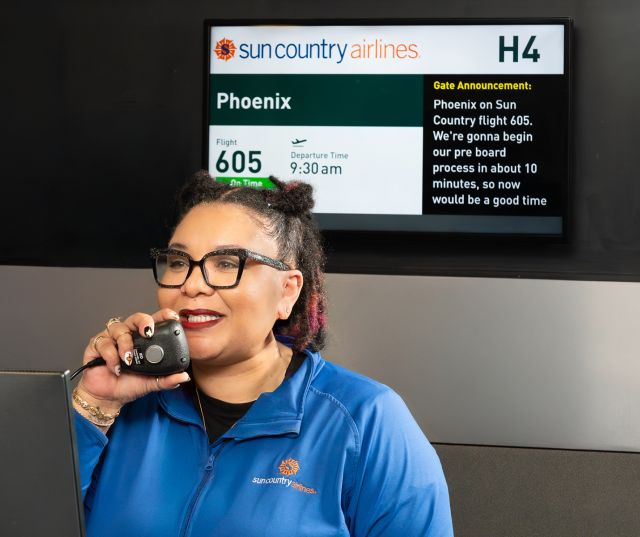MSP Airport debuts enhanced accessibility programs for travelers who are deaf, hard of hearing

Aira ASL and talk-to-text offer first of their kind communication platforms
Minneapolis-St. Paul International Airport (MSP) is expanding its internationally accredited accessibility program with two novel initiatives aimed at helping travelers and airport visitors who are deaf or hard of hearing.
MSP is launching Aira’s pilot American Sign Language (ASL) interpreting service, Aira ASL. A separate program being rolled out is called talk-to-text, which uses technology to convert live airline announcements into text that is displayed for passengers at the gate.
“These new programs offer our passengers, visitors and customers who are deaf or hard of hearing more independence and real-time assistance across MSP terminals and facilities,” said Phil Burke, assistant director of customer experience for the Metropolitan Airports Commission, which owns and operates MSP. “Thanks to key technology partners and input from MSP’s Travelers with Disabilities Committee, we are able to broaden our services that help to meet the diverse needs of those who travel through the airport.”
Aira ASL
Aira is launching its first Aira ASL pilot offering travelers who are deaf or hard of hearing secure, on-demand access to professional ASL interpreters. Interpreters will partner with callers through their mobile phones to enhance the ease and efficiency of travel across all kinds of situations — including checking in, changing flights, making retail transactions, or finding ground transportation options. There is no charge to users who access the program while traveling through MSP.
“There is a significant gap in the availability of on-demand ASL interpreting in everyday situations and public spaces. Existing solutions often require advance scheduling, or the use of hard-to-locate access points, or outdated devices,” said Jill Ratliff, vice president of business development at Aira. “Aira ASL is an innovative solution because it can be accessed anytime, anywhere, using personal devices. Our geofence technology provides deaf and hard-of-hearing travelers immediate, frictionless access to an interpreter, and offers the deaf and hard-of-hearing community interpreting on their own terms anywhere on the MSP property.”
Aira has had a presence at MSP since 2018, offering on-demand professional visual interpreting for individuals who are blind or who have low-vision. Aira services are accessed with the Aira app available through Apple App Store or Google Play Store.
Talk-to-text
Talk-to-text captures the voice announcement of a Sun Country Airlines agent. Courtesy: Metropolitan Airports Commission
MSP has also implemented its own talk-to-text platform to improve travel communications for passengers who are deaf or hard of hearing. Live airline gate announcements are now displayed in real time on gate monitors in Terminal 2, which serves six airlines: Sun Country, Southwest, Frontier, Allegiant, Condor and Icelandair. MSP is also using the system in its “common use” gates in Terminal 1, Gates E1-E4 (Alaska and Spirit), and plans to expand the service to additional gates and airlines in the near future.
The idea of real-time captioning for gate announcements was brought forward to MSP’s Travelers with Disabilities Committee (TDAC) by its chair, Andrew Palmberg, who is deaf and also serves as the representative for the Minnesota Commission of the Deaf, DeafBlind & Hard of Hearing.
“I've personally missed gate changes and other announcements at the gate in the past and had this same experience happen to other deaf and hard-of-hearing friends, causing them to miss their flight and be rebooked on a later flight, creating more stress and frustration,” Palmberg said. “As a traveler with a disability, I am always hyper-focused on happenings around my surroundings to ensure I am not missing any information about my flight. The talk-to-text technology reduces my stress, frustration and reliance on gate agents to inform me what is occurring around me and the flight.”
Palmberg said the accessible technology can also benefit travelers who may better comprehend written text, or any other travelers who need clarity when there can be overlapping announcements in a noisy environment.
Accessibility at MSP
TDAC has championed more than 20 accessibility initiatives since its formation in 2014. The committee consists of community disability advocates, airport staff, and representatives from airlines, their contractors and the Transportation Security Administration. Another TDAC-endorsed project now underway will add tactile maps at the entrances of all restroom facilities at MSP to assist those travelers who are blind or have low vision.
MSP has earned the highest level of accreditation for passenger accessibility by Airports Council International, a global organization representing more than 1,900 airports in 170 countries. The program is based on international best practices and recommendations across multiple areas of accessibility: policies, infrastructure design, organizational operations, innovative technologies and customer experience programs.